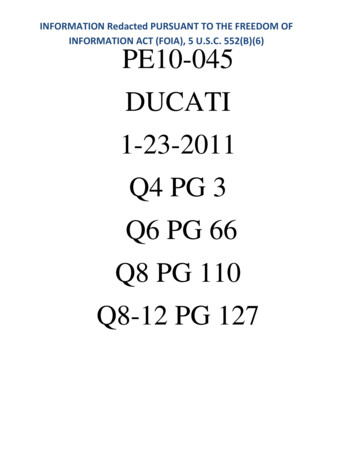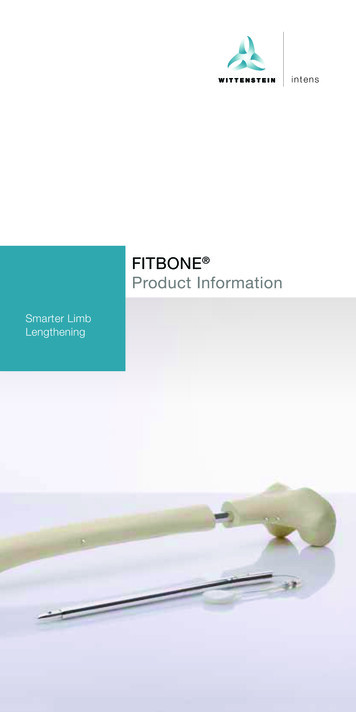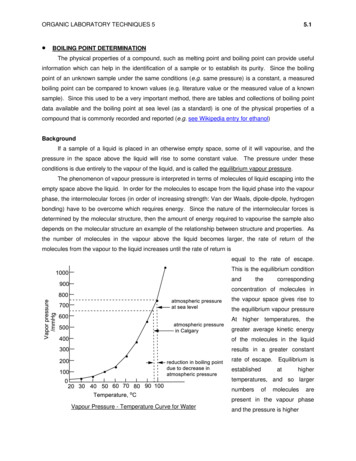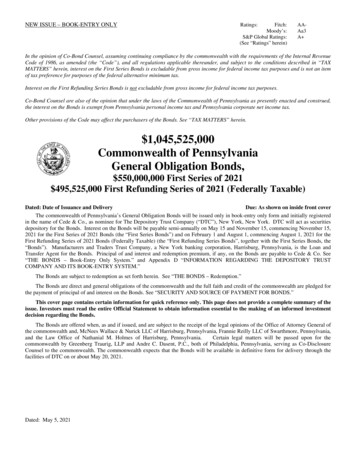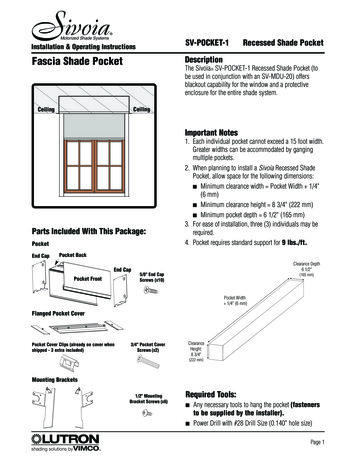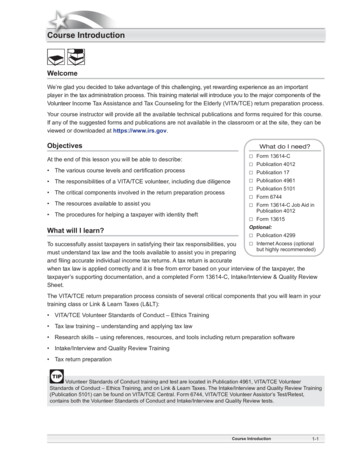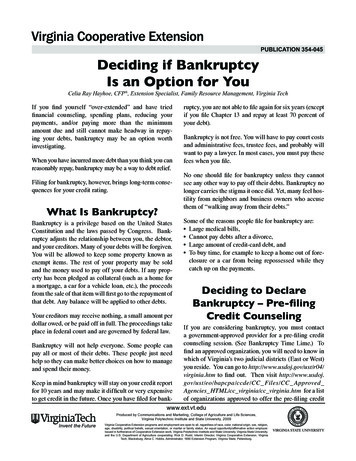
Transcription
publication 354-045Deciding if BankruptcyIs an Option for YouCelia Ray Hayhoe, CFP , Extension Specialist, Family Resource Management, Virginia TechIf you find yourself “over-extended” and have triedfinancial counseling, spending plans, reducing yourpayments, and/or paying more than the minimumamount due and still cannot make headway in repaying your debts, bankruptcy may be an option worthinvestigating.When you have incurred more debt than you think you canreasonably repay, bankruptcy may be a way to debt relief.Filing for bankruptcy, however, brings long-term consequences for your credit rating.What Is Bankruptcy?Bankruptcy is a privilege based on the United StatesConstitution and the laws passed by Congress. Bankruptcy adjusts the relationship between you, the debtor,and your creditors. Many of your debts will be forgiven.You will be allowed to keep some property known asexempt items. The rest of your property may be soldand the money used to pay off your debts. If any property has been pledged as collateral (such as a home fora mortgage, a car for a vehicle loan, etc.), the proceedsfrom the sale of that item will first go to the repayment ofthat debt. Any balance will be applied to other debts.Your creditors may receive nothing, a small amount perdollar owed, or be paid off in full. The proceedings takeplace in federal court and are governed by federal law.Bankruptcy will not help everyone. Some people canpay all or most of their debts. These people just needhelp so they can make better choices on how to manageand spend their money.Keep in mind bankruptcy will stay on your credit reportfor 10 years and may make it difficult or very expensiveto get credit in the future. Once you have filed for bank-ruptcy, you are not able to file again for six years (exceptif you file Chapter 13 and repay at least 70 percent ofyour debt).Bankruptcy is not free. You will have to pay court costsand administrative fees, trustee fees, and probably willwant to pay a lawyer. In most cases, you must pay thesefees when you file.No one should file for bankruptcy unless they cannotsee any other way to pay off their debts. Bankruptcy nolonger carries the stigma it once did. Yet, many feel hostility from neighbors and business owners who accusethem of “walking away from their debts.”Some of the reasons people file for bankruptcy are: Large medical bills, Cannot pay debts after a divorce, Large amount of credit-card debt, and To buy time, for example to keep a home out of foreclosure or a car from being repossessed while theycatch up on the payments.Deciding to DeclareBankruptcy – Pre-filingCredit CounselingIf you are considering bankruptcy, you must contacta government-approved provider for a pre-filing creditcounseling session. (See Bankruptcy Time Lime.) Tofind an approved organization, you will need to know inwhich of Virginia’s two judicial districts (East or West)you reside. You can go to http://www.usdoj.gov/ust/r04/virginia.htm to find out. Then visit http://www.usdoj.gov/ust/eo/bapcpa/ccde/CC Files/CC ApprovedAgencies HTML/cc virginia/cc virginia.htm for a listof organizations approved to offer the pre-filing creditwww.ext.vt.eduProduced by Communications and Marketing, College of Agriculture and Life Sciences,Virginia Polytechnic Institute and State University, 2009Virginia Cooperative Extension programs and employment are open to all, regardless of race, color, national origin, sex, religion,age, disability, political beliefs, sexual orientation, or marital or family status. An equal opportunity/affirmative action employer.Issued in furtherance of Cooperative Extension work, Virginia Polytechnic Institute and State University, Virginia State University,and the U.S. Department of Agriculture cooperating. RIck D. Rudd, Interim Director, Virginia Cooperative Extension, VirginiaTech, Blacksburg; Alma C. Hobbs, Administrator, 1890 Extension Program, Virginia State, Petersburg.
counseling. The Eastern District providers are listedfirst followed by the Western District providers. Besure you get a Department of Justice Certificate that youreceived this kind of counseling. The counseling is todetermine if you can work with an informal repaymentplan or if you really need to file. You are required toparticipate but not to go through with any offer from theprovider to manage a repayment plan. If you accept therepayment plan, you will not file. However, if a repayment plan is offered and you do not accept, you willhave to submit it to the court along with the certificate.Make sure you receive your pre-filing credit counselingcertificate and make a copy for your records.information on VCE in-person classes, visit www.ext.vt.edu/personalfinance/.Bankruptcy Time Line1. S eek pre-filing credit counseling within six monthsof filing; go to http://www.usdoj.gov/ust/eo/bapcpa/ccde/CC Files/CC Approved Agencies HTML/cc virginia/cc virginia.htm to find a governmentapproved organization; obtain pre-filing credit counseling certificate.2. T ake your pre-filing credit counseling certificate tothe bankruptcy lawyer.If the counselor says you are approved to file bankruptcy, contact a lawyer experienced in bankruptcy proceedings. The lawyer will require you to give her/himthe counseling certificate to go with your documents.The lawyer will require you to complete a means testform to determine if you can qualify to file Chapter 7;if you do not qualify for Chapter 7, the means test willdetermine how much you have for debt repayment forChapter 13. In addition, the lawyer will help you prepare the necessary documents and file with the court.Discuss attorney and court fees at the first appointmentbecause costs vary.3. C omplete the means test to determine if you qualifyfor Chapter 7 or Chapter 13 bankruptcy4. F ile a bankruptcy petition with the clerk of the bankruptcy courts.5. Pay court costs and administrative fees.6. C lerk gives petition to United States Trustee (bankruptcy trustee).7. U nited States Trustee takes charge of nonexemptproperty, reviews petition, and in Chapter 13, reviewsrepayment plan.Pre-discharge PersonalFinance Education Class8. C ourt approval of repayment plan (Chapter 13only).Before your petition can be discharged (released fromthe court), you must take a personal finance educationclass. The class must be at least two hours long andcover a set of objectives determined by the ExecutiveOffice of United States Trustees. Classes can be in person, over the phone, or by Internet. Providers mustbe approved by the trustees’ office in a manner similarto those providers offering the pre-filing credit counseling. For a list of providers in Virginia, visit http://www.usdoj.gov/ust/eo/bapcpa/ccde/DE Files/DEApproved Agencies HTML/de virginia/de virginia.htm. Eastern District providers are listed first followedby Western District providers. You do not need to usethe same provider for both pre-filing counseling classand pre-discharge education class. You will need tohave filed and have a case number when you register totake the personal finance education class.9. C ompletion of plan over three to five years (Chapter13 only).10. Nonexempt property sold to pay debts (Chapter 7only).11. C omplete the pre-discharge personal finance classand obtain certificate of completion; go to http://www.usdoj.gov/ust/eo/bapcpa/ccde/DE Files/DE Approved Agencies HTML/de virginia/devirginia.htm to find a government approved provider; obtain a Certificate of Debtor Education.12. Forgiveness of dischargeable debts.13. End of court proceedings.Automatic Stay ProvisionVirginia Cooperative Extension (VCE) offers onlythe in-person personal finance education class, NOTthe pre-filing credit counseling session. For moreSome people file bankruptcy because of the automaticstay provision, the part of the bankruptcy code that offers2
legal protection against bill collectors. Even though thissounds inviting, the automatic stay provision should notbe the only reason you file. The automatic stay stops: C hapter 13 – used by people who have an income Chapter 11 – for businesses filing for bankruptcy Chapter 12 – for family farmers and familyfishermen C ollection activities, such as calls and letters fromyour creditors; Filing of liens, lawsuits, or seizure of property byyour creditors; Utility companies from disconnecting your utilitiesfor at least 20 days; Foreclosure on your home mortgage; Collection of the overpayment of public benefits; and Wage garnishments.Chapter 7 BankruptcyChapter 7 is a “liquidation” of nonexempt assets topay debts. It is also referred to as straight bankruptcy.Through a lawyer, you petition the court to have yourselfdeclared unable to pay your debts. You will be requiredto pay (in 2006) a 245 filing fee, a 39 administrationfee, and a 15 trustee fee for a total of 299.Under the new law, the automatic stay provision no longer applies to: Evictions; Suspension or restriction of driver’s license; Suspension or restriction of a professional or occupational license; Lawsuits to establish paternity, child support, or childcustody; Divorce proceedings; Lawsuits related to domestic violence; Certain tax proceedings; Administrative freezes – a bank can’t withdraw moneyfrom your account to pay a delinquent loan but theycan freeze enough money in the account to cover thedelinquency until the court determines what will happen with the debt; and Criminal proceedings.In filing Chapter 7 bankruptcy, your honestly incurred,dischargeable debts – those not incurred by fraudor intentional harm to another person – are forgiven(canceled).You receive a fresh start without worrying about pastcreditors coming to you for payment. The fresh startpromised is relief from most debts and the ability tobegin rebuilding your life with substantially less debt– not a clean credit slate. (See the section on Nondischargeable Debts later in this publication for a list ofdebts that are not forgiven.) In exchange, you surrender all nonexempt property under state law to a trusteewho will divide it among your creditors in proportionto what you owe. (See Chapter 7 Virginia Exemptions.)The trustee will usually abandon property to the extentthat it was used as collateral. It may be possible for youto reaffirm (agree to pay) the debt with the creditor andretain the property. The trustee may also abandon property that is difficult to sell. If this happens, you maykeep this property. As you consider Chapter 7 bankruptcy, inventory your debts to determine which can bedischarged and your property to see what you wouldhave to sell.Income TaxesUnder the new law there is a requirement that you provide past tax returns. You must provide: C hapter 7 – the income tax return for the most currentyear (i.e. if you file in October 2006, you must havefiled your 2005 income taxes); Chapter 13 – past four years; or Proof that income was such that you did not have tofile.Dischargeable DebtsAfter Chapter 7 bankruptcy, you will not longer owemoney on: Credit cards; Retail charge cards, such as department stores; Unsecured loans from banks, credit unions, financecompanies, friends, or relatives (an unsecured loan isone in which no item was pledged as collateral); Unpaid hospital and medical bills; Unpaid utility bills; and Unpaid rent (but you must move).The tax consequences of bankruptcy can vary dramatically depending on the way the bankruptcy is structured.Planning with a tax attorney or an accountant may bemoney well spent before you file for bankruptcy.There are four provisions in the bankruptcy laws: Chapter 7 – used most often by people who are unemployed or deeply in debt3
Discharge only applies to debts that you incurred beforeyou filed and listed on your application. If you do notlist a debt, it is possible that debt will not be discharged.Your debts also may not be discharged if you do not listall of your assets. Once a debt is discharged you do notneed to pay it. However, you can voluntarily choose torepay it without signing a reaffirmation agreement.nonexempt assets into exempt assets before filing. Consult a lawyer who can help you choose to your bestadvantage.In states where there is a choice of federal or stateexemptions, both spouses must choose the same type ofexemptions. In those states where you have the right tochoose, you should seek preplanning assistance from alawyer. Under The Bankruptcy Abuse Prevention andConsumer Protection Act of 2005 assets are valued atreplacement cost at a retail vendor taking into accountthe assets age and use. (You used to be able to value it atwhat it would sell for at a yard sale or auction.)If you have special reasons you want to pay a debt thatcould have been discharged, you can sign a reaffirmationagreement. For example, you may want to keep your caror your home. This must be a voluntary agreement, notplace too heavy a burden on your family, and be in yourbest interest. The court must approve your decision toreaffirm a debt. If you plan to reaffirm an item be sureyou keep the payments up to date so that the property isnot seized when your bankruptcy is discharged.Chapter 7 VirginiaExemptionsHomestead Exemptions pursuant to § 34-4 and34-4.1 Code of Virginia. 5,000 in equity in your home ( 10,000 if husbandand wife file together) plus 500 per dependent (forexample, each child) 2,000 wildcard exemption if you are a disabled veteran and own a homeNondischargeable DebtsThese debts are not eliminated by Chapter 7 bankruptcy. You will still owe the following: S tate and federal taxes – unless they are more thanthree years old; Child support required by law; Spousal maintenance (alimony); Government-backed student loans (only dischargeable in special circumstances); Debts due to fraud; Court fines and penalties; Debts due to death or injury caused by the operationof a motor vehicle while intoxicated; and Debts due to willful or malicious injury to anotherperson or property.Poor Debtor Exemptions pursuant to § 34-26 Codeof Virginia 2,000 in equity in your vehicle (car, truck, etc.) Bible, wedding and engagement rings 1,000 worth of clothing 5,000 worth of family portraits and heirlooms 5,000 worth of household furnishings 4,000 worth of farm equipment 10,000 in tools of your trade (implements, books,and tools) 5,000 wildcard exemption of any property if you donot claim equity in a home Employer sponsored retirement plans regardless ofthe amount if they meet the laws (ERISA) that governretirement plans Individual retirement accounts (IRAs) may be exempt;ask a lawyerExemptionsYou will be allowed to keep some of your property tosurvive after bankruptcy. You must live in a state for atleast two years (40 months for homestead exemptions)to take advantage of that state’s exemptions. Otherwise you must use the exemptions available in the statewhere you used to live. In some states you can choosebetween the federal and state exemptions. Increasingly,states are allowing only state statutes to determine theexemptions. Under Virginia statutes, federal exemptions are not allowed. If you and your spouse are bothfiling, each of you has a set of exemptions.Chapter 13 BankruptcyChapter 13 bankruptcy is called “Adjustment of Debtsof an Individual with Regular Income.” It is also knownas the debtor-rehabilitation chapter. Under Chapter 13,the debtor who can make regular payments is given theopportunity to propose a realistic plan to pay creditorsExemption planning involves deciding what to includein your state exemptions. You may be able to convert4
over three to five years (depending on the results of yourmeans test and the amount of your debt) while supervised by a trustee. A spouse without regular incomemay file joint bankruptcy with an income-earningspouse. If you file Chapter 13, your income is used topay part or all of the debts through a plan filed withthe bankruptcy court. The repayment plan must be filedin “good faith” and designed so that creditors receiveat least as much as they would under Chapter 7. Youmay use Chapter 13 bankruptcy if your unsecured debtsare less than 307,625 (2006) and your secured debt isless than 922,975 (2006). A secured debt is an assetpledged as collateral that can be sold to repay it, such asa car loan, mortgage, or furniture loan. An unsecureddebt has no collateral to secure its repayment, such ascredit-card debt or medical bills. If you successfullycomplete the Chapter 13 repayment plan, you will befree of your debts. One exception is home mortgages,which must be repaid according to the contract. A copy of your repayment plan has been given to allcreditors and interested parties, and In 2006, a 235 filing fee and a 39 administration feefor a total of 274 have been paid.The court and your trustee (usually a local lawyerappointed by the United States Trustee) must approveyour plan. Your creditors do not necessarily need toapprove it. After the plan is approved, you will makemonthly payments to the trustee and pay your regularliving expenses yourself. If you have a mortgage, youwill make those monthly payments while the trusteeusually pays any amounts in arrears before you filedbankruptcy.Chapter 11 BankruptcyChapter 11 was designed by Congress to allow businesses to reorganize their debts and pay what theycan without folding. Unlike Chapter 13, there usuallyis no trustee involved in Chapter 11. It was originallydesigned for large corporate debtors, but is now available to partnerships, real estate developers, and soleproprietors. Working with creditors, a debtor works outa repayment plan from future earnings of the business.The creditors approve a plan reorganizing any or allother business affairs.To determine whether Chapter 13 bankruptcy is appropriate, the court will use the means test to determine ifyour take-home pay, other income sources, and livingexpenses will allow you to repay debts within a reasonable time period. Filing for Chapter 13 forces an automatic end to all your credit and contracts with creditorsexcept home mortgages. You are allowed to keep yourproperty but may sell some of it to help complete yourrepayment plan.Chapter 11 is available to individual debtors whose debtsexceed the limits imposed by Chapter 13. However, thefiling fee (including administrative fee) is much higher, 1,039 in 2006.If you decide to file Chapter 13 bankruptcy, you willsubmit all your disposable income (amount left afteryou pay normal living expenses) to the trustee who paysyour creditors according to the plan. During the repayment period, a debtor is protected from further collection activities by creditors. Little or no sale of assets isrequired. Once you file your plan and it is approved,interest stops accruing on your current debts.Chapter 12 BankruptcyChapter 12 was established in 1986 especially for farmers and fishermen. It combines some requirements ofboth Chapter 11 and Chapter 13. Farmers and fishermen are eligible for Chapter 12 bankruptcy if their debtdoes not exceed 1,500,000. In addition, 80 percent ormore of the debt must be due to operations. At least50 percent of the stock or equity of the corporation orpartnership must be held by one family, with that familyconducting the farming or fishing operation, and morethan 80 percent of the value the corporation or partnership assets must be related to the operation of the business. Finally, if corporate stock exists, that stock mustnot be publicly traded.Depending on your situation, the income available fordebt repayment may be less than the amount of yourunsecured debts. If this is the case, then the plan reflectsyour request that your debts be discharged (canceled)when the repayment period ends. A court hearing willbe held after the plan is filled. At the hearing, the courtwill decide if: T he repayment plan is truly your best “good faith”effort, Unsecured creditors are receiving at least as much asthey would have under a Chapter 7 bankruptcy case, The plan can be feasibly completed in the timeallowed,In Chapter 12, the owner is allowed to file a plan forpaying off some debts and discharging (canceling) others. Creditors must receive as much as they would have5
received under Chapter 7 bankruptcy. The filing andadministrative fee for Chapter 12 is 234 in 2006.If you are uncomfortable or lack confidence in the lawyer after discussing facts and fees, discontinue the relationship at the beginning. Continuing may only lead tomore unhappiness and costs that could be avoided.Fees and Legal HelpThe Virginia Legal Aid Society may be able to helpindividuals who cannot afford a lawyer. There areincome restrictions that must be met to qualify to uselegal aid lawyers.Counseling and personal finance education providersmay charge a fee for their services. However, they haveto keep you even if you cannot afford to pay. Different groups have different requirements for who does nothave to pay, so shop around.Phone: (800) 552-9963 or (888) 201-2772A lawyer experienced in bankruptcy proceedings cangive you valuable advice. If you already have a lawyer,ask about her or his experience and successes in bankruptcy cases. If it is not your lawyer’s area of expertise,ask for a referral. People who have filed bankruptcymay be able to suggest a lawyer they used. If you needa lawyer referral, call the Virginia Lawyer Referral Service at (800) 552-7977 or (804) 775-0808 (metro Richmond area).Website: www.vlas.org/For a listing of individual legal aid offices in Virginiago to www.vlas.org/ and click Office Locations on theleft-hand side. If your location is not listed, scroll downthe page and click additional outreach locations.ConclusionA person leaves bankruptcy debt free or with a significantly reduced debt. Bankruptcy is designed to givethe debtor a fresh start and a chance to establish soundfinancial management.Bankruptcy trustees, reporters, and others who see lawyers in action may be able to suggest lawyers. You mayfind a visit to bankruptcy court helpful.Calling several lawyers and interviewing them beforemaking your choice may be to your advantage. Callahead and see what they will charge for the initialappointment. Some may offer a short interview at nocharge.ReferencesLeonard, R. (2001). Bankruptcy: is it the right solutionto your debt problems? Nolo Press. Berkeley, Calif.After you select a lawyer, be prepared to give all therelevant facts. Completely disclosing all your assets,debts, and other commitments is essential for a thorough evaluation.The New Bankruptcy Law, bankruptcy.findlaw.com/new-bankruptcy-law/. Accessed October 24, 2006.Western District of Virginia (4th Circuit), United StatesBankruptcy Court website, http://www.vawb.uscourts.gov/courtweb/enter1.html. Accessed July 6, 2006.Do not be afraid to discuss fees. Fees are usually statedas an hourly charge. The lawyer cannot give you anexact figure but can estimate a cost range. Ask for information about fees in writing.The Department of Justice, U. S. Trustee Program,www.usdoj.gov/ust/. Accessed October 24, 2006.Acknowledgments: The author would like to thank Pat Santos, Executive Office of United States Trustees (Department of Justice); John W.L. “Chip” Craig II, clerk of the Western District of Virginia (4th Circuit) U.S. BankruptcyCourt; and Robin Taylor, Heather Greenwood, and Lou Gorr, Virginia Cooperative Extension Family and ConsumerSciences agents, for acting as reviewers of this publication.Original author: Karen P. Goebel, Extension Specialist, University of Wisconsin.6
reasonably repay, bankruptcy may be a way to debt relief. Filing for bankruptcy, however, brings long-term conse-quences for your credit rating. What Is Bankruptcy? Bankruptcy is a privilege based on the United States Constitution and the laws passed by Congress. Bank-ruptcy adjusts the relationship between you, the debtor, and your creditors.
